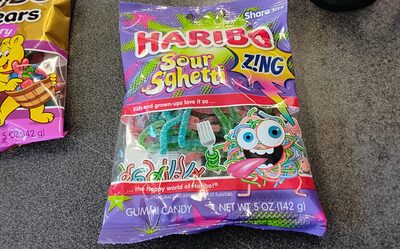
Barcode: 042238358898
Haribo Sour S’ghetti
DOUBTFUL
📝 Reason: This product contains ingredients requiring further verification. Their Halal status depends on undisclosed processing details and source materials that need clarification.
🏷️ Category: Snacks, Sweet Snacks, Confectioneries
📄 Certificates: None
Ingredients:
Details
Understanding the Halal Status of Haribo Sour S’ghetti
Haribo Sour S’ghetti is a popular confectionery snack loved for its unique texture and tangy taste. However, when it comes to determining its Halal status, there are some doubts to consider. Let’s explore the ingredients and other factors that play a role in this assessment.
Why is the Halal Status of Haribo Sour S’ghetti Doubtful?
The Halal status of Haribo Sour S’ghetti is labeled as ‘Doubtful’ due to certain ingredients that require clarification regarding their sources or processing methods. When assessing food products for Halal compliance, it is essential to ensure that all components meet Islamic dietary law. In this case, the ingredient list includes both known Halal substances and those that necessitate closer inspection.
Ingredient Breakdown
- Sugar: Permissible in Islam. A basic sweetener with no concerns regarding Halal compliance.
- Corn Syrup: Permissible in Islam. Another common sweetener derived from corn.
- Corn Starch: Generally permissible unless it has been processed with Haram additives. The ambiguity surrounding processing practices could impact its Halal certification.
- Sorbitol (E420): This sugar alcohol is often used as a sweetener or humectant and is considered permissible in Islamic dietary laws.
- Wheat Flour: This component is also permissible in Islam but must be free of contamination with Haram elements.
- Citric Acid (E330): A common preservative and flavoring agent that is generally Halal, though it’s essential to ensure it comes from Halal sources.
- Malic Acid (E296): Another acid that serves as a flavor enhancer and is also considered suitable for Halal diets.
- Artificial and Natural Flavors: This is where we encounter potential concerns. The sources of these flavors often remain undisclosed, which creates uncertainty regarding their Halal compliance.
- Carnauba Wax (E903): Typically used in candy as a coating agent, it is also generally regarded as Halal.
- Artificial Colors:
- Blue 1: Its Halal status is not explicitly confirmed due to lack of information.
- Yellow 5: Permissible in Islam. A synthetic dye that is widely used.
- Red 40: Also deemed permissible, a popular red dye used in food products.
Factors to Consider
Given that some ingredients, particularly artificial flavors, lack comprehensive descriptions regarding their sourcing and processing, consumers must exercise caution. Furthermore, the absence of any Halal certification adds to the uncertainty surrounding the product’s compliance with dietary laws.
Conclusion
In conclusion, while many ingredients in Haribo Sour S’ghetti are permissible in Islam, the ambiguity of some components—specifically artificial flavors—renders its Halal status doubtful. When making decisions regarding consumption, it is always best to prioritize products with clear, verified Halal certifications. Currently, Haribo Sour S’ghetti does not have any such certifications. If you’re looking for a Halal snack, consider exploring options that have transparent ingredient sourcing and verified certifications instead.
